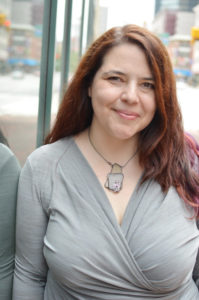Meet the 2019 Isaac Asimov Science Award Recipient, Pamela Gay

Dr. Pamela Gay is an astronomer, writer, and podcaster focused on using new media to engage people in science and technology. Her most well-known project is Astronomy Cast, a podcast in its ninth year that she co-hosts with Fraser Cain (producer of Universe Today). She also helped build the CosmoQuest virtual research facility, a second-generation citizen science site designed to provide the public with opportunities to participate in NASA-related science programs, while also giving them access to online seminars, star parties, classes, and more.
“Humans are one people sharing one sky, and there is simply too much universe for scientists to try and understand without help,” she’s said. “As a scientist, I work to communicate science to the public, making the world my classroom. Then I invite those people to help us explore the universe with me through citizen science.”
Dr. Gay’s passion for science communications is evident in her work blogging about astronomy at StarStryder.com, and in frequent public talks and popular articles in Astronomy, Sky and Telescope, and Lightspeed magazines, and in appearances on TV shows like The Universe.
She received a BS in astrophysics from Michigan State University in 1996 and a PhD in astronomy from the University of Texas in 2002. Today, Dr. Gay is the current director of CosmoQuest and a senior scientist at the Planetary Science Institute (the largest non-governmental employer of planetary scientists in the world with researchers and educators in twenty-five states and the District of Columbia, as well as Australia, Canada, France, Germany, Ireland, Israel, Latvia, New Zealand, Russia, Serbia, and the United Kingdom). Although her first research love was and remains variable stars, she has also used her technology skills to explore the secrets of galaxy evolution and planetary surface geology.
In a 2012 interview with God & Nature magazine, Dr. Gay spoke about her personal Christian faith and how important she thinks it is to combat anti-science positions held by religious fundamentalists. “Most of us are for love and understanding—of other people and for creation, itself,” she said.
One of my goals is to get people actively engaged in learning about the universe that they’re part of…. People who deny science are denying how detailed and beautiful the cosmos really is. They’re living in a universe that is just too small.
The AHA is proud to present Dr. Gay with the American Humanist Association’s 2019 Isaac Asimov Science Award at Carnegie Mellon University in Pittsburgh, Pennsylvania, on June 7, the first segment of the AHA’s first-ever free, livestreamed rolling conference. To register and see more awardees, visit conference.americanhumanist.org.
“To receive an award named after Isaac Asimov is a particular honor,” Gay notes.
My own love of science originated in a love of science fiction and a desire to learn what science in that fiction could be made possible. Today I hope to find ways to inspire future writers to write new stories using modern science. It is through these future histories that we so often learn how science can potentially corrupt, but also advance and liberate our society.
